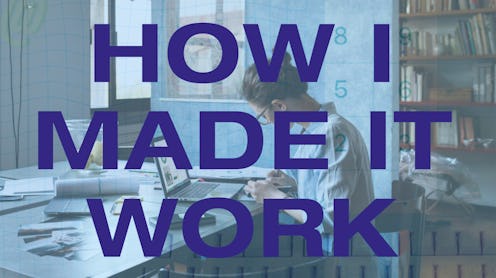Life
How A Freelance Graphic Designer From London Made It Work On £3,000 A Month

Welcome to How I Made It Work — Bustle UK's financial series which aims to demystify money and the process of achieving financial stability. This time HIMIW hears from a 35-year-old freelance graphic designer who owns a house in London and prioritises job satisfaction over guaranteed income. Read on to find out how she made it work.
Age: 35
Occupation: Freelance graphic and web designer for the wellness and food industries
Location: London
How would you describe your current financial status?
Overall sufficient for living and paying a mortgage in London but need my partner's income to help with child-related costs.
What is your current salary and how long have you been earning this amount?
Gross income fluctuates between £2000 and £4,500 per month. Average would say is £3k which took two years to reach and has been steady for three years.
Do you receive regular financial help from friends, family, or a partner? How do you think this has impacted your relationship with money?
We had help buying our house from our families, and my partner and I share household and child related costs (his income is much higher).
Is a £30 Deliveroo worth an hour's work?
How would you describe your relationship to money?
I think choosing to go freelance and accepting the fluctuating income that goes along with that means that money isn't the very top of my priority list. But, by the same token, it's often on my mind as I am solely responsible for what I bring in every month. I can be really careless with spending money, often falling into the trap of regular small expenses that build up. But it's easier as a freelancer to remind myself that whatever I buy directly equates to time spent on client work — is a £30 Deliveroo worth an hour's work?
Do you believe you feel you are currently in a stable position financially?
Overall yes, but month to month the income varies. I wouldn't say I have a lot put away for unexpected expenses or holidays.
How did you achieve stability?
We've been extremely lucky with family support. Helping me and my brother get on the ladder was one of my dad's most important goals before he passed away. To reach my average £3,000 per month, I work with a handful of long-term clients for the base income and one-offs for the rest. Graphic design is a great industry for repeat business and retainers which really help predict future income. I find business tools like Freeagent invaluable for giving me easy-to-understand information about my earnings and to log expenses. It's much easier to budget and forecast revenue these days — online accounting is much more user friendly now.
Ironically I was probably more financially stable in my 20s
If you feel financially stable, has this been the case for most of your life, a few years, or is it a very recent thing?
Ironically my 20s were probably more stable as I had a salaried job as a marketing manager and a wedding photography business bringing in extra income. More recently, I've chosen to prioritise job fulfilment over guaranteed income. I put some time (and money) aside to re-train as a graphic designer and started freelancing straight away. It felt weird doing this in my early thirties especially with baby-planning on the horizon, but better than finding myself in the same position 10 years later. At first it was about not being fussy over what design work I took on. Bit by bit the business and brand grew, mainly through word of mouth and pigeon-holing myself as a health and fitness creative. Instagram wasn't as big in 2015 so I'm sure things could have happened quicker in this climate.
What does financial stability look like to you?
Not having to do a quick calculation about whether you can afford every small expense. Being able to put aside enough at the end of each month to pay tax. Being able to survive for at least two quiet months of little to no income. Having a small cushion for unexpected expenses like a new boiler. Having a base monthly income that doesn't really change month on month. Not worrying about things like having the heating on or switching lights off all the time.
What advice would you give to younger women who are worried about achieving financial stability?
It's clichéd but save, save, save. Make it automatic. There are amazing tools out there to get skilled with budgeting like Cleo and Monzo. Don't be scared to check your account regularly. Look for different income streams so you can handle ups and downs. I've recently read The Multi-Hyphen Method by Emma Gannon and am now looking to diversify into creating templates and products to have another line coming in.
Reflect on where your attitude towards money comes from.
What one piece of advice would you give to younger women who want to improve their relationship to money?
Sit down and reflect on where your attitude towards money comes from. How was money dealt with and talked about when you were younger? Are there parts of this that help or hinder you today? Do a quick tot up of monthly expenses — it doesn't take long and puts you in a position to instantly know what's going out every month relative to your earnings. From there, cut the wasted expenses and create a monthly budget with apps like Cleo. Use a Monzo card to control spending and stay within budget. Within a couple of months you'll be shopping a lot smarter and putting aside more savings each month. Remember to give yourself rewards for making good money decisions.